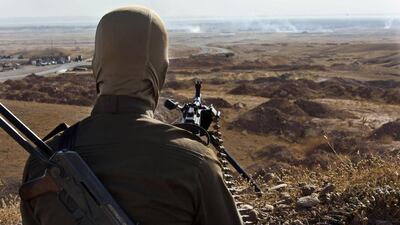The Iraqi government will send troops to a lawless province near Baghdad that has seen increasing attacks on pro-Iranian militias, a senior Iraqi security official said.
National Security Adviser Qasem Al Araji told official media on Saturday that Prime Minister Mustafa Al Kadhimi has instructed him to boost security forces in Diyala province, a stronghold of Shiite militias seen as loyal to Tehran.
“These troops will arrive soon to the province to arrest those who are threatening citizens’ lives,” Mr Al Araji said after visiting Diyala.
“The security forces will be able to get rid of all of the groups that operate outside the law,” he said, referring to attacks against the militias as “terrorist” action.
Mr Al Araji did not define the mission of the extra troops or when they will be sent to Diyala, with many Iraqis blaming militias for the lawlessness.
The announcement was made as Iraqi Defence Minister Juma Saadoun was on a visit to Tehran to discuss closer military co-operation, Iranian media said, two weeks after senior Iranian security officials were in Baghdad.
Diyala, on the border with Iran, is a main supply route for Shiite militias, who act as warlords in the province and other areas where the grip of the central government is weak.
The province is inhabited by Sunnis, Shiites and Turkmen and is one of Iraq's main farming regions. Many Sunnis regard their community as particularly aggrieved by the militias.
The militias blame ISIS for increasing attacks against them in Diyala and other Sunni or mixed provinces north of Baghdad in the last few months. In many instances there have been no claims of responsibility for the attacks.
Mr Al Kadhimi, a former intelligence chief, has sought since taking office in May to rein in the Shiite militias, which are loosely grouped into a government organisation called the Popular Mobilisation Forces.
He travelled to a main border crossing in Diyala in July and declared that the frontier had become “a hotbed for corrupt people", a reference to smuggling and other illicit activity overseen by the militias.
The prime minister, Mr Araji said, is giving Diyala high priority.
Since the state declared victory against ISIS in 2017, Diyala has been a theatre for operations by the military and the PMF against what the government describes as ISIS sleeper cells in the country.
The authorities said early this month that a bomb killed three women and wounded three policemen in Diyala. Days later they said a roadside bomb killed two PMF members in the oil producing province of Kirkuk.
They said the three women were riding a three-wheeled vehicle – known as a satuta – north of the city of Baquba when the roadside bomb exploded.
Iranian media quoted Defence Minister Amir Hatami on Sunday as telling his Iraqi counterpart that security co-operation between the two countries is a model in what he described as a fight against terrorism.
Mr Hatami said Iran considers it paramount to "establish stability and security" in Iraq, and "we are ready to participate in the reconstruction and development" of the country.
Earlier this month Iranian security officials, including Deputy Defence Minister Qassem Taqi, visited Baghdad.
The high-level Iranian delegation met Iraqi officials to discuss “deepening mutual co-operation on issues relating to security and countering terrorism and crime in all their forms," the Iraqi interior ministry said.
Last Sunday at least 11 people died when militants launched an orchestrated attack on an Iraqi military post in western Baghdad, authorities said.
They said ISIS gunmen opened fire on a monitoring tower in Al Radhwaniyah district, guarded by paramilitary troops.

